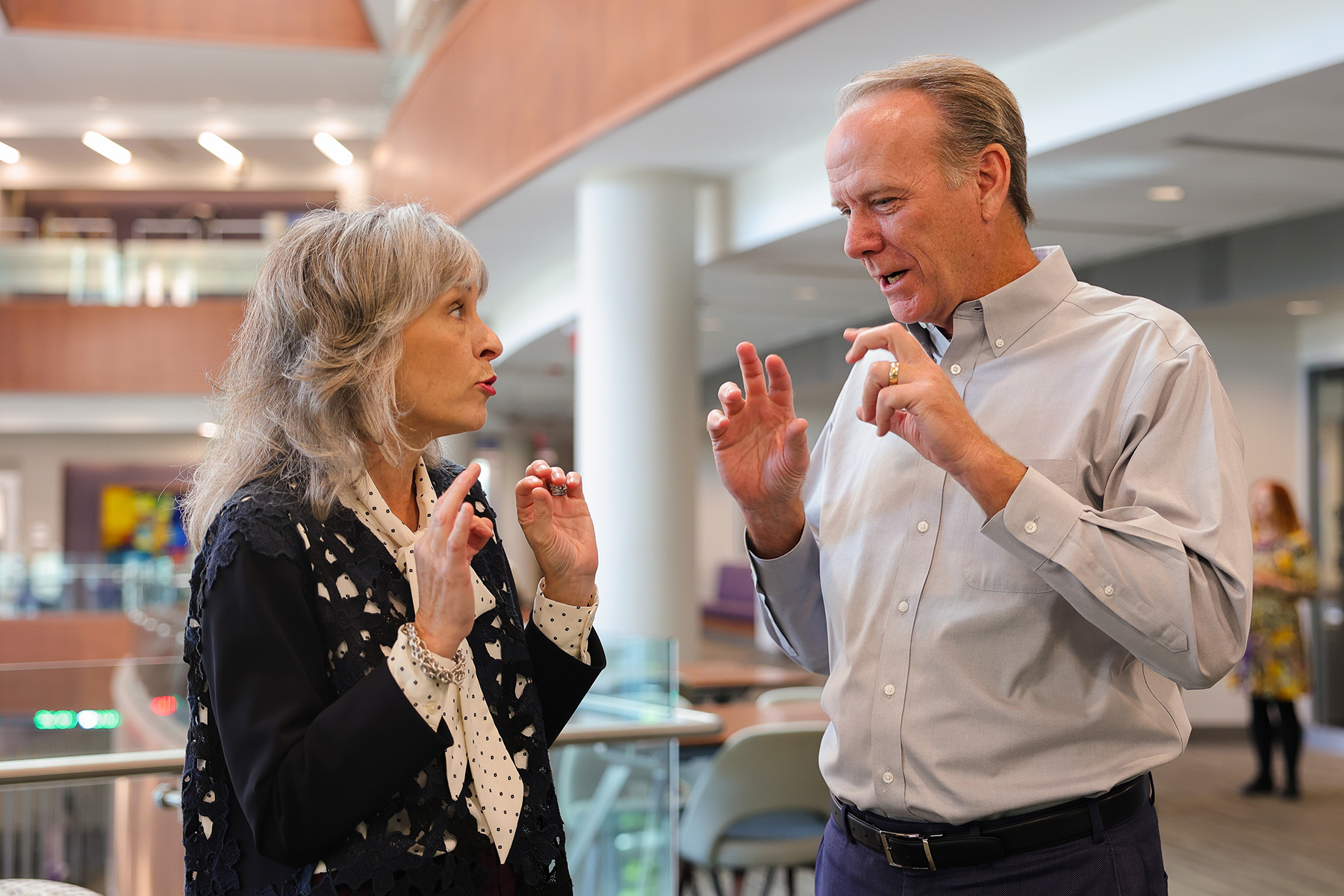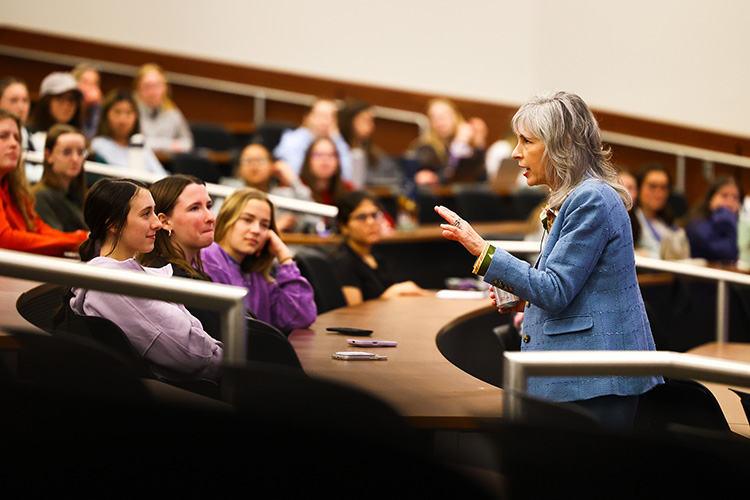Showing Up
Through the executive-in-residence program, one-on-one mentorship, and a new class on leadership, Leanne Caret is sharing the insights she learned as she grew into a CEO with a 30-year career at Boeing.
 So many of Leanne Caret’s memories of her years at Boeing are visceral. Hearing Chinook helicopters, capable of lifting 25,000 pounds, roar away from the facility she ran in Ridley Park, Pennsylvania. Standing on the flightline, watching Air Force One take off. Being hit by the rumble of a B-52 bomber as it ran touch-and-go landing drills. Feeling her favorite purple abaya – the full-length robe worn by many women in some Muslim-majority countries – flow perfectly around her in Saudi Arabia.
So many of Leanne Caret’s memories of her years at Boeing are visceral. Hearing Chinook helicopters, capable of lifting 25,000 pounds, roar away from the facility she ran in Ridley Park, Pennsylvania. Standing on the flightline, watching Air Force One take off. Being hit by the rumble of a B-52 bomber as it ran touch-and-go landing drills. Feeling her favorite purple abaya – the full-length robe worn by many women in some Muslim-majority countries – flow perfectly around her in Saudi Arabia.
Her time at the company’s facilities in Wichita were “like a dream come true,” she said. “You’re driving down the street with the sunroof open, listening to AC/DC. You’re seeing aircraft that you’re working on taking off, and you smell the harvest. It was fabulous.”
That dream came true was one that developed over time, however. In the 1980s, as a student in the College of Business Administration and as a young professional, she wasn’t sure what she wanted from her career.
“I didn’t have aspirations for [Boeing] to be anything other than a job. I didn’t have aspirations of airplanes flying at night. I didn’t dream of spaceships launching. I needed to pay the bills,” Caret said.
Paying the bills ultimately turned into serving as CEO of the Fortune Global 500 company’s Defense, Space & Security division, a position she retired from in 2022, having moved up through a variety of operations and management positions. The multibillion-dollar business makes up about half of Boeing’s revenue.
Her experiences at the company taught Caret to identify opportunities, develop teams, and conceive the strategies to take advantage of those opportunities. They also earned her a spot on Fortune Magazine’s Most Powerful Women list five years in a row.
How you show up matters
Now she’s sharing those skills with K-State students through the college’s executive-in-residence program. She’s working with faculty and staff within the college to put together a series of workshops on leadership and confidence that is her brainchild. Caret and her husband Steve recently endowed the directorship of the Center for Principled Business through a multimillion-dollar gift, as well.
 “This is all about men and women knowing how to have a corporate career,” she said. “I want folks to know: How do you show up at work and how do you have presence? How do you get yourself through a reception or a social hour? How do you have dinner conversations? How do you have that conversation in the elevator when you happen to stumble upon a senior leader and you have five floors to navigate it?”
“This is all about men and women knowing how to have a corporate career,” she said. “I want folks to know: How do you show up at work and how do you have presence? How do you get yourself through a reception or a social hour? How do you have dinner conversations? How do you have that conversation in the elevator when you happen to stumble upon a senior leader and you have five floors to navigate it?”
“How you show up matters. It’s not always convenient. And it’s sometimes hard…These programs are going to be experiential learning, which I think is super important.”
These powerful lessons are still guiding her well today, as she serves on the board of directors at Deere & Company (often known as John Deere) and RTX Corporation (formerly Raytheon Technologies), as well as the KSU Foundation and the USO. And they’re central to her mentorship of students: Even at the top of the org chart, there’s no such thing as having paid your dues. You should never be the smartest person in the room. Self-confidence is key.
Treating the people around you well – and truly understanding their particular skills – is also invaluable in a leadership role.
“Treat your colleagues well. One day they may work for you. One day you may work for them. But all in all your colleagues are going to help you get through the good times and the bad times. The person you’re reporting to only has so much attention to spare, so that horizontal network is critical,” she said.
Even if people only have so much attention to spare, Caret is already sharing hers by providing one-on-one mentoring. Caret is showing up for students like Sophie Schumacher, an undergraduate in marketing from Seneca.
 “Having Leanne as a mentor gives me an outside perspective to bigger picture situations. She and I have very similar stories in how we were brought up and how we made/are making our way through college, so it’s really valuable for me to hear her story and the success she has attained through perseverance and hard work,” Schumacher said.
“Having Leanne as a mentor gives me an outside perspective to bigger picture situations. She and I have very similar stories in how we were brought up and how we made/are making our way through college, so it’s really valuable for me to hear her story and the success she has attained through perseverance and hard work,” Schumacher said.
“It inspires me to continue to work towards my goals, because she is proof that the hard work will pay off.”
I just want the best talent
Being a CEO is often lonely work, according to Caret.
“You have to have enough self-confidence and belief in yourself to get up and face into the challenges,” she said. “The decisions you’re making impact lives, they impact customers…And there are so many conversations that you can’t share with other folks.”
Self-confidence was an important part of her early career. And it’s an indispensable tool for anyone working in leadership and management.
“I was very different from anybody else. I was told early in my career that I would never make management because I laughed too much, I smiled too much. I just wanted to be me, but I had to become comfortable being who I was because I worked in an environment and in a time in our world where owning those kinds of differences was hard,” she said.
“If the U.S. is going to lead the world in innovation, we need to grab all the great talent that’s available…We shouldn’t settle as a nation. For me, this is fundamental.”
The insights Caret provides through her visits, mentorship, and classroom leadership apply to everyone. Students are already seeing the benefit.
“A big thing that Leanne has helped me realize is that no matter how much of a planner you are, life is going to throw curveballs at you. This has been something I need to constantly remind myself of as I move through life,” Schumacher said. “It's just nice to know I always have Leanne in my corner. She is always celebrating my successes with me, and she has always supported me through my failures.”
The C-Suite Unscripted
Leanne Caret’s efforts to make sure anyone with drive and grit can be ready for a career in management and leadership don’t stop with her commitment to KSU. She recently launched a monthly newsletter called The C-Suite Unscripted, promising “Real Life. Real Leadership. Real Laughs.”
She’s out to be “the Erma Bombeck of business” with the newsletter and to deliver advice to people who want to succeed in the field.
“Leanne is as relatable and grounded as she is accomplished,” Marcia Hornung, director of the Center for Principled Business, said. “She’s walked the path from a K-State classroom to leading a multibillion-dollar global business – and she shares that journey with humility, humor, and heart.”
Subscribe to The C-Suite Unscripted on LinkedIn.